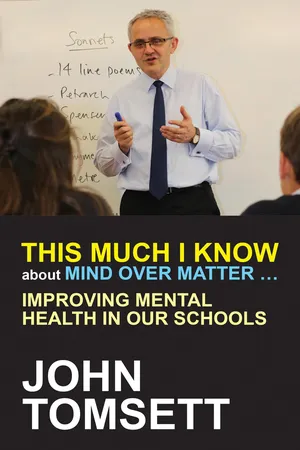
This Much I Know About Mind Over Matter ...
Improving Mental Health in Our Schools
- 300 pages
- English
- ePUB (mobile friendly)
- Available on iOS & Android
About this book
In This Much I Know about Mind Over Matter John Tomsett addresses, with refreshing honesty, the growing problem of the mental health issues experienced by children and young people, offering up a plan for averting a mental health crisis in our schools. Tomsett interweaves his formative and professional experience with strategies for addressing students' mental health issues and insights from his interviews with high profile thinkers on the subject including Professor Tanya Byron, Natasha Devon, Norman Lamb, Tom Bennett, Claire Fox and Dr Ken McLaughlin. The book is replete with truths about the state of children's mental wellbeing, about creating a school culture where everyone can thrive and about living in the shadow of his mother's manic depression. With his typical mixture of experience, wisdom and research-based evidence, Tomsett explains how he manages the pressure of modern day state school headship in a climate where you are only as good as your last set of examination results, a pressure which acutely affects staff and students too. He outlines his strategies for mitigating this pressure and turning the tide of students' mental health problems. The autobiographical narrative modulates between self-effacing humour and heart-wrenching stories of his mother's life, blighted by mental illness. His professional reflections are a wisdom-filled blend of evidence-based policy and decades of experience in teaching and school leadership. Tomsett writes with genuine humility. His prose is beautiful in its seeming simplicity. When you pick up one of his books you will find you have read the first fifty pages before you have even noticed: surely the hallmark of truly great writing. Topics covered include: the real state of the nation's mental health, the perfect storm that is precipitating a mental health crisis in schools, the problems of loose terminology what do we really mean when we talk about a mental health epidemic? and poor understanding of mental health problems and mental illness, the disparity between mental and physical health in public discourse, treatment and funding, beginning the conversation about mental health, the philosophical and psychological principles underpinning the debate, strategies to support students in managing their own mental health better, resilience, growth mindset, mindfulness, grit, failure and mistakes, coping with pressure, York's school wellbeing workers project, evidence-based strategies that have worked in Huntington School, metacognitive strategies for improving exam performance, interviews with professionals in the field, the reality of living with a parent with a serious mental illness, self-concept and achievement, perfectionism, the relationship between academic rigour and therapeutic education and, significantly, what the research says, what the experts say and what Tomsett's experience says about adverting a mental health crisis in schools. Suitable for teachers, leaders and anyone with an interest in mental health in schools.
Tools to learn more effectively

Saving Books

Keyword Search

Annotating Text

Listen to it instead
Information
Un-love letter


Mind over matter
Can make a Heaven of Hell, a Hell of Heaven.
Table of contents
- Cover
- Praise
- Title Page
- Dedication
- Epigraph
- Acknowledgements
- Contents
- Preface
- 1: Un-love letter
- 2: Mind over matter
- 3: The signal and the noise
- 4: Going, going …
- 5: The view from here: Rt Hon. Norman Lamb MP
- 6: Let them do it
- 7: The view from here: Claire Fox
- 8: Heart-stopping
- 9: What’s the worst thing that can happen?
- 10: Live hard
- 11: The view from here: Natasha Devon MBE
- 12: Manic
- 13: Feel the fear but be a head teacher anyway
- 14: Inevitability
- 15: The view from here: Dr Ken McLaughlin
- 16: Perspective
- 17: Think to thrive
- 18: Failure
- 19: Mindfulness, growth mindset and grit
- 20: Embarrassed
- 21: The view from here: Professor Tanya Byron
- 22: Happiness
- 23: Wisdom
- 24: The best medicine
- 25: The view from here: Tom Bennett
- 26: Calm
- 27: Who owns the child?
- 28: Déjà vu
- 29: Metacognitive tools for performing well in examinations
- 30: Someone to do nothing with
- 31: Turning the tide?
- 32: Survival
- End note
- Bibliography
- Copyright
- Advertisement
Frequently asked questions
- Essential is ideal for learners and professionals who enjoy exploring a wide range of subjects. Access the Essential Library with 800,000+ trusted titles and best-sellers across business, personal growth, and the humanities. Includes unlimited reading time and Standard Read Aloud voice.
- Complete: Perfect for advanced learners and researchers needing full, unrestricted access. Unlock 1.4M+ books across hundreds of subjects, including academic and specialized titles. The Complete Plan also includes advanced features like Premium Read Aloud and Research Assistant.
Please note we cannot support devices running on iOS 13 and Android 7 or earlier. Learn more about using the app